Herodotus, bk 8, logos 24
Herodotus of Halicarnassus (c.480-c.429 BCE): Greek researcher, often called the world's first historian. In The Histories, he describes the expansion of the Achaemenid Empire under its kings Cyrus the Great, Cambyses, and Darius I the Great, culminating in Xerxes' expedition to Greece (480 BCE), which met with disaster in the naval engagement at Salamis and the battles at Plataea and Mycale. Herodotus' book also contains ethnographic descriptions of the peoples that the Persians have conquered, fairy tales, gossip, and legends.
The naval battle of Salamis (8.40-96)
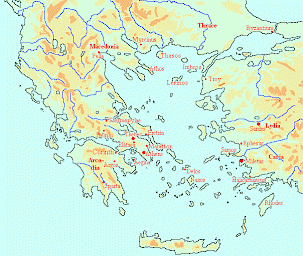
The next logos opens with a description of a serious quarrel between the Greek admirals. According to Herodotus, the Athenians insist that their compatriots must send their fleets to Salamis, a small island just opposite the Athenian harbors. The Athenians act like this, because they do not trust the Spartans, who had promised to send an army to Boeotia to defend Athens, but were actually building a wall across the Corinthian isthmus and destroying the road leading to the isthmus, which is usually called Skiron's road.
With the navies at Salamis, there would at least be some protection against the Persian invasion. The Greek commanders agree to the Athenian demand, and a navy of no less than 378 galleys gathers at Salamis. They disagree, however, about their future movements. Most admirals think that Salamis is a dangerous place to stay, because they will be trapped after a naval defeat; they suppose it is better to go to Corinth, where they can defend the wall without running risks of entrapment.
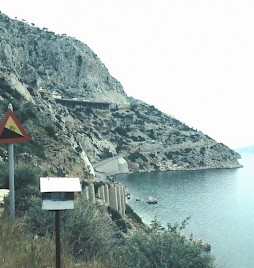
The admirals are not yet decided when they hear that Xerxes has entered Athens. The city itself had been undefended, although there had been a small garrison on the acropolis - people who had believed that the 'wooden wall' mentioned in the oracle (above) was the palisade surrounding the temple of the goddess Athena, the Parthenon. Too late, they had discovered that they had misinterpreted the Delphian god's prophecy. After killing these people, Xerxes had ordered the looting of the temple. On hearing this terrible news, the supreme commander of the Greek navy, the Spartan Eurybiades, decides to leave Salamis and to go to Corinth.
Comment
As usual, Herodotus focuses on the moral issue - Spartan betrayal of Athens - and ignores the strategic realities. Defending Athens in the flat countryside of Boeotia would have been an act of gallant irresponsibility, because the superior numbers of the invaders would have outmatched the brave Greek soldiers. After Thermopylae, Athens was lost, and the Athenians had been aware of this bitter truth from the moment Themistocles had proposed to evacuate the city and entrust it to the goddess Athena (above). The only hope for Athens and for Greece was to prevent Xerxes to keep up a large army. As pointed out (cf. above), the Persian army was very large and had to be supplied by the fleet. Only by destroying the Persian navy, the Greeks could force Xerxes to reduce the overwhelming size of his army. They had failed to do so at Artemisium; now they would do so in the straits between Salamis and the mainland.
Skiron's road can be found a little west of Megara, a town between Athens and Corinth. At the moment, there are two roads, but one can easily imagine that this was a very narrow path in Antiquity. Remains of the wall across the Corinthian isthmus can still be seen near the sanctuary of the Isthmian Poseidon.
A Greek decision to evacuate Salamis would have been irresponsible. As long as the Greeks stayed at Salamis, the Persians could not enjoy the safety of the Athenian harbor, Phaleron. Therefore, Xerxes' admirals were forced to attack the Greek navy in the shallow and narrow bay of Salamis. If the Greeks evacuated their advantageous position, they gave the Persians a marvelous present: a save harbor. The invaders would be able to sweep across the Aegean Sea, and could easily contact the pro-Persian city of Argos. The Spartans could build the largest wall in the world, but it would be useless. As we will see, Themistocles had means to force his allies into battle at Salamis.
The naval battle of Salamis (cont.)
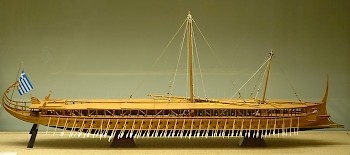
In the middle of the night, Themistocles goes to Eurybiades, convincing the Spartan that it was necessary to stay. The supreme commander organizes a meeting of the admirals, but Themistocles' proposal is rejected, until the Athenian announces that if the Greeks will give up Salamis, the Athenians will give up the struggle, take their families on board and sail to Italy with their navy of two hundred vessels. The result of this blackmail is that everybody agrees to stay and fight.
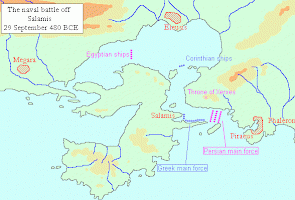
Next day, when Xerxes is sacrificing in Athens, the Persian navy arrives at Phaleron. The great king orders his army to go to Corinth before the Spartan king Cleombrotus, a brother of Leonidas, can complete the wall.note According to Herodotus, the Greek admirals become very scared when they see the Persian fleet approaching, and some decide to evacuate Salamis. Themistocles understands that they will only stay and fight if the Persians make the mistake to attack the Greeks in the narrow and shallow bay. During the night, he sends a trusted slave to Xerxes, and this man informs the great king that if he wants an easy victory, he has to attack immediately, because the Greeks will leave the island at dawn.
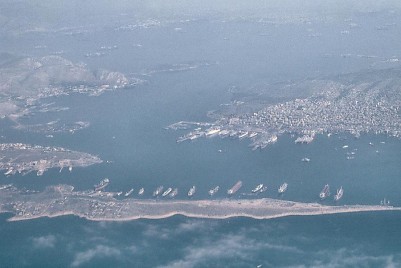
Xerxes swallows the bait. Under cover of an almost moonless night, his large navy enters the bay. The Greeks learn from this maneuver from Panaetius, a Greek who had been forced to join the Persian navy and now sees his opportunity to defect. At dawn, Xerxes' navy suddenly finds itself under attack; since the bay is narrow, the superior numbers of the invaders mean nothing. The great king, who is sitting on a hill, sees how his fleet is defeated. Herodotus has special attention for the exploits of one commander in the Persian navy, Artemisia, the queen of Halicarnassus.
Commentary
This naval engagement can be dated on 29 September 480 BCE (28 September is less likely). According to one modern estimate, more than five hundred of the thousand Persian vessels were damaged when the Greek navy attacked the Persian flank. A more reasonable reconstruction assumes that the Persians allowed only one third of their fleet to enter the narrow strait, and that half of this third was destroyed. (The other two thirds were transport ships.)
However this may be, the backbone of Xerxes' navy was broken, and it would be difficult to build a new navy. The Persians were forced to retreat. Several army units would continue the struggle, with Thessaly and Macedonia as supply base; Mardonius was appointed general. But many troops were sent home, because the transport ships that would bring them food, were from now on unprotected.
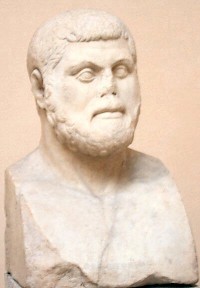
The odd story about Themistocles' trick to lure the Persians into the Bay of Salamis may be true, because it is also mentioned in the near contemporary tragedy The Persians by the Athenian playwright Aeschylus.
During the winter, Xerxes went to Sardes. From here, he could oversee how Mardonius, with a smaller but more effective army, would conquer the Peloponnese. At the same time, Xerxes could keep an eye on the eastern territories.
It should be stressed that from a Persian perspective, the 'Greek war' was not lost after Salamis. On the contrary. Xerxes had won a naval victory off Artemisium and had won a battle at Thermopylae. He had added Thessaly and Boeotia to the Persian empire and had destroyed the temples at Athens. In short, he had avenged the destruction of the temple of Cybele at Sardes (above) and had shown the Athenians how he would destroy the towns of the liars, who offered earth and water but did not behave like true subjects. In spite of the losses at Salamis, Xerxes, the great king, king of kings, king of countries containing many kinds of men, king in this great earth far and wide, son of king Darius, the Achaemenid, could truthfully state in the Daiva inscription that, by the favor of Ahuramazda, he ruled 'all the Yaunâ, those who dwell on this side of the sea and those who dwell across the sea.'